高中英语总复习语法系列各种时态复习和练习
文档属性
| 名称 | 高中英语总复习语法系列各种时态复习和练习 |

|
|
| 格式 | zip | ||
| 文件大小 | 420.5KB | ||
| 资源类型 | 教案 | ||
| 版本资源 | 通用版 | ||
| 科目 | 英语 | ||
| 更新时间 | 2017-12-22 00:00:00 | ||
图片预览

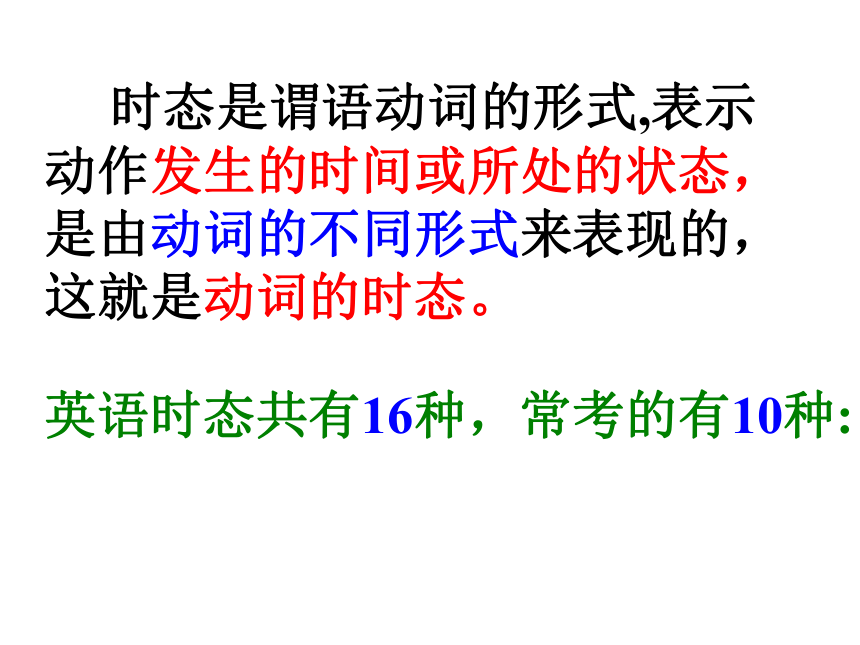

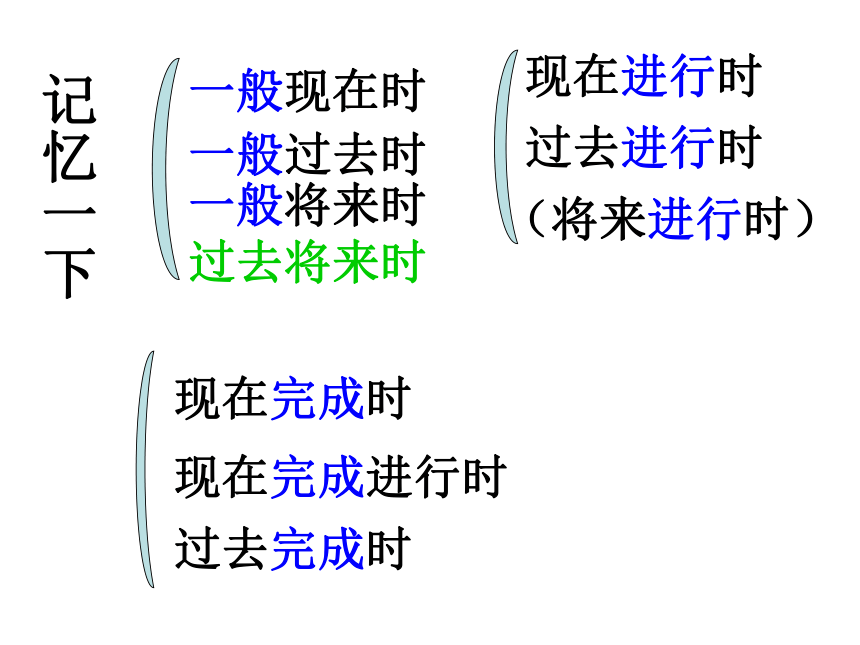
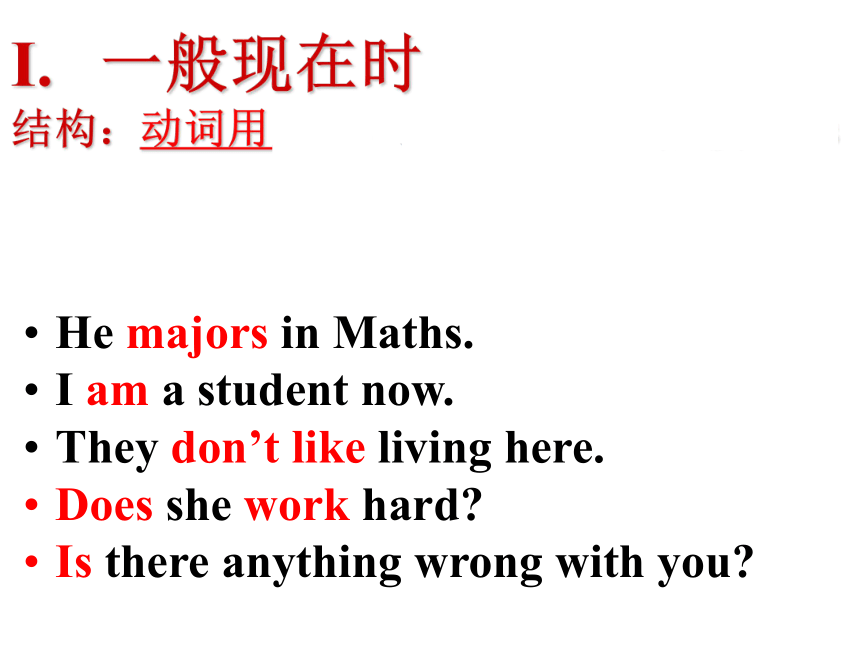
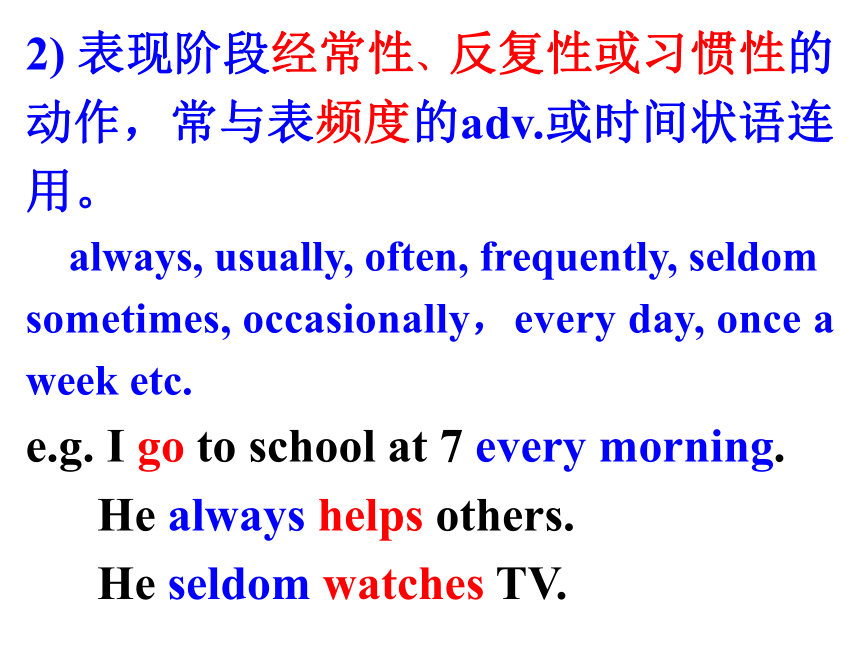
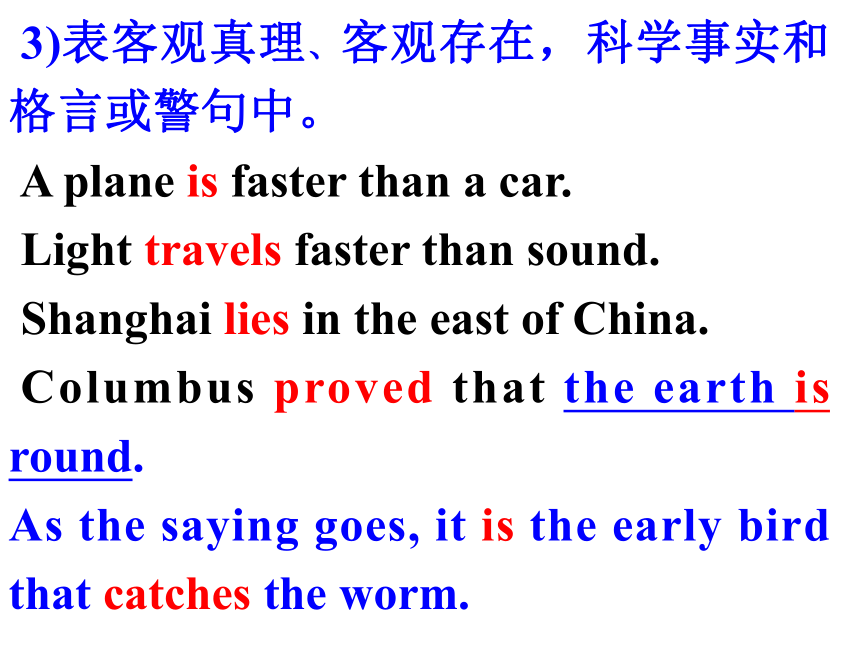
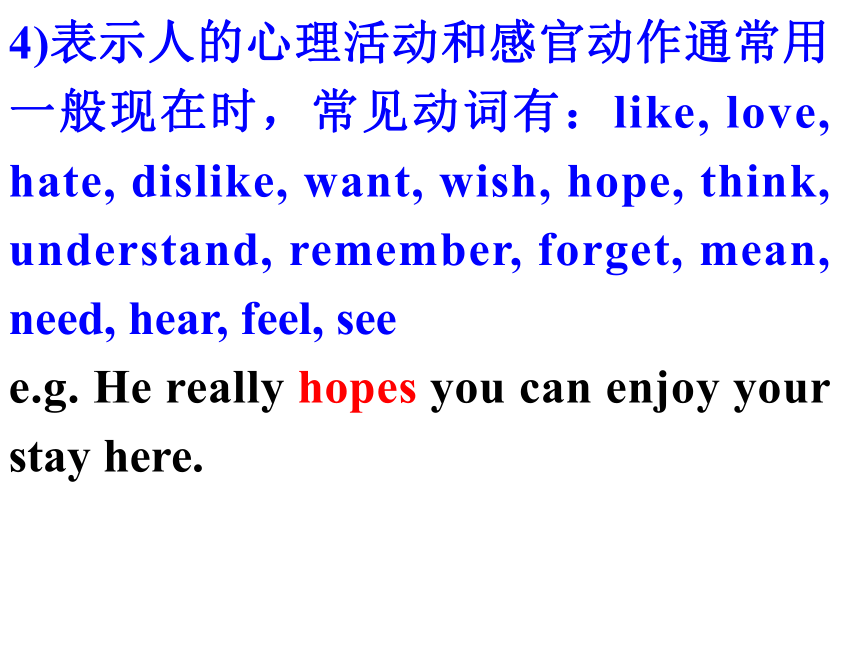
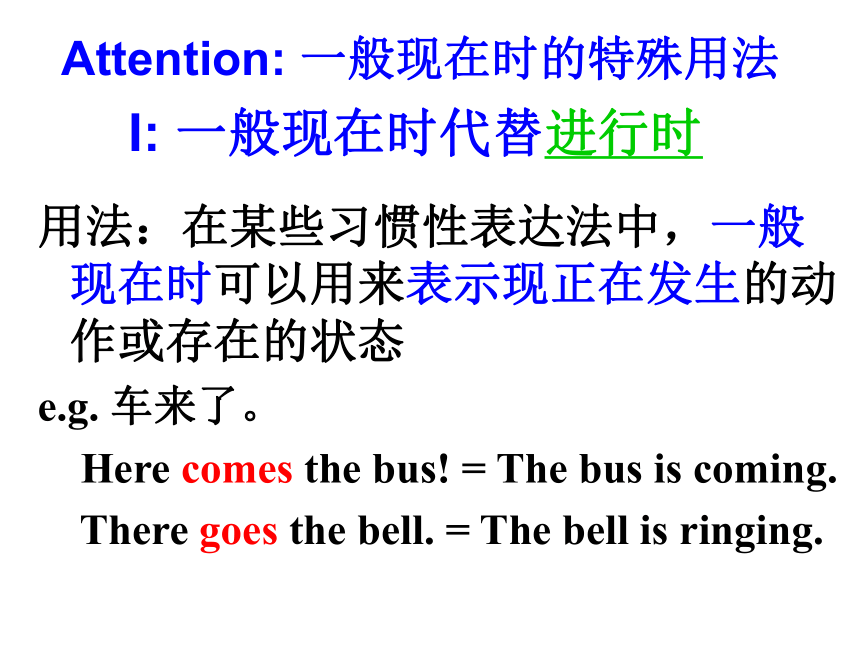
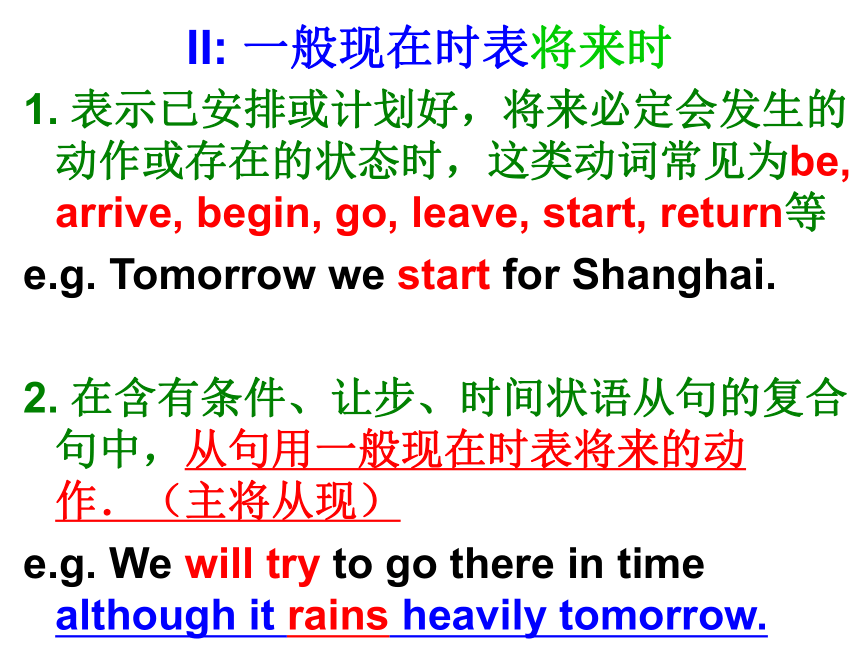
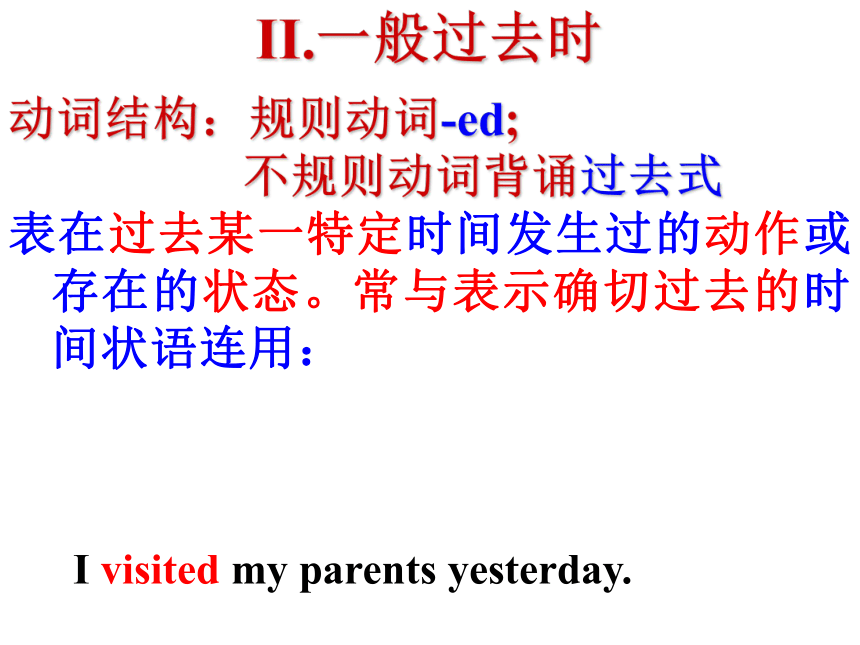
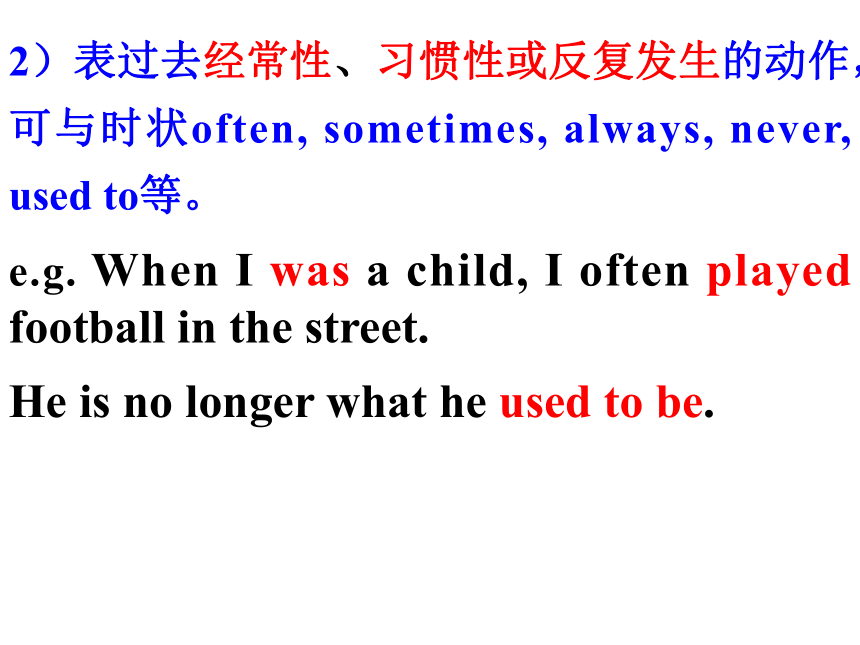
文档简介
课件46张PPT。高中英语总复习语法系列
英语时态
时态是谓语动词的形式,表示动作发生的时间或所处的状态,是由动词的不同形式来表现的,这就是动词的时态。英语时态共有16种,常考的有10种: 1. 一般现在时 (do/does) 2. 一般过去时 (did) 3. 一般将来时 (shall/will do) 4. 过去将来时 (would do) 5. 现在进行时 (am/is/ are doing ) 6. 过去进行时 (was/were doing ) 7. 将来进行时 (shall/will be doing) 8. 现在完成时 (have/has done) 9. 过去完成时(had done ) 10. 现在完成进行时(have/has been doing )一般现在时一般过去时一般将来时 过去将来时现在进行时过去进行时(将来进行时)现在完成时现在完成进行时过去完成时记忆一下
意义和用法:
(1) 表现在的状态、情况
He majors in Maths.
I am a student now.
They don’t like living here.
Does she work hard?
Is there anything wrong with you?
I. 一般现在时 结构:动词用原形,主语是三单,后接-s/-es2) 表现阶段经常性、反复性或习惯性的动作,常与表频度的adv.或时间状语连用。
always, usually, often, frequently, seldom
sometimes, occasionally,every day, once a week etc.
e.g. I go to school at 7 every morning.
He always helps others.
He seldom watches TV. 3)表客观真理、客观存在,科学事实和格言或警句中。
A plane is faster than a car.
Light travels faster than sound.
Shanghai lies in the east of China.
Columbus proved that the earth is round.
As the saying goes, it is the early bird that catches the worm.4)表示人的心理活动和感官动作通常用一般现在时,常见动词有:like, love, hate, dislike, want, wish, hope, think, understand, remember, forget, mean, need, hear, feel, see
e.g. He really hopes you can enjoy your stay here.I: 一般现在时代替进行时用法:在某些习惯性表达法中,一般现在时可以用来表示现正在发生的动作或存在的状态
e.g. 车来了。
Here comes the bus! = The bus is coming.
There goes the bell. = The bell is ringing.Attention: 一般现在时的特殊用法II: 一般现在时表将来时1. 表示已安排或计划好,将来必定会发生的动作或存在的状态时,这类动词常见为be, arrive, begin, go, leave, start, return等
e.g. Tomorrow we start for Shanghai.
2. 在含有条件、让步、时间状语从句的复合句中,从句用一般现在时表将来的动作.(主将从现)
e.g. We will try to go there in time although it rains heavily tomorrow.一般过去时
动词结构:规则动词-ed; 不规则动词背诵过去式
表在过去某一特定时间发生过的动作或存在的状态。常与表示确切过去的时间状语连用:yesterday, last week, an hour ago, the other day, in 1982, just now以及when引导的时间状语从句
Where did you go just now?
I visited my parents yesterday. 2)表过去经常性、习惯性或反复发生的动作,可与时状often, sometimes, always, never, used to等。
e.g. When I was a child, I often played football in the street.
He is no longer what he used to be.
III.一般将来时
动词结构:will/shall+动词原形 (shall用于一人称,在征求意见时常用于二人称)
表示将来某一时刻或经常发生的动作或状态。时间状语有:
tomorrow, next year, one day, soon, someday, sometime, in the future
We’ll go at six o’clock tonight.
I will/shall graduate form this school soon.一般将来时有几种特殊形式:
1. am/is/are going to do:表示将来。
(1)表示主观计划、安排要发生的事
e.g. The play is going to be produced next month.
We are going to see a movie tonight.
(2) 有迹象表明很可能要发生的事
Look at the dark clouds; there is going to be a storm.2. be to do:表将来
表示客观安排或受人指示而做某事。
e.g. We are to discuss the report next Saturday.
I am to play football tomorrow afternoon.
I am going to play football tomorrow afternoon. 3. be about to do:表即将发生的动作,
注意:不与tomorrow, next week等表示明确的将来的时间状语连用。
e.g. He is about to leave for Qingdao .
注:be about to…when 就要做…这时…
e.g. I was about to go out when the telephone
rang.4. 瞬间动词如begin, start ,come, go, leave等的一般现在时或现在进行时表即将发生的动作。e.g. (1) We start at 6 and arrive at the station at 7.
(2) The train is leaving .
(3) They are leaving for Tibet.IV. 过去将来时 结构:would/should+do表示在过去预计将要发生的动作,常用于宾从中.
e.g. (1)The students said they would go to visit the Great Wall the next day.
(2) When it rained, he would bring an umbrella with him.(表示过去经常性的动作)V、现在进行时
结构:am/is/are +doing
1. 表此时此刻正在进行的动作,常与now, at the moment, for the time being, for the present等表示现在时间的状语连用.
e.g. We are having classes now.
2. 表示近段时间正发生而此刻不一定在进行的动作。
e.g. (1) Mr. Green is writing another novel.
(2) She is learning piano under Mr. Smith.3. 进行时与always, usually, often, constantly, continually等频度词连用,表经常或反复发生的动作,而且表示批评、不满、讨厌、赞扬或惊讶等感彩。
e.g. (1) You are always forgetting the important thing.
(2) You are constantly finding fault with me.
(3) He is always thinking of others.
VI:过去进行时
结构:was/were +doing
表示过去某一时刻正在进行的动作,时间状语为:at that time, at the moment, this time yesterday, when, while.
e.g. He was cooking supper this time yesterday.
. VII: 将来进行时
结构:will / shall be doing表将来某时刻或某一阶段正在进行的动作或状态。e.g. My parents will be waiting for me at the airport tomorrow afternoon.
Dear, when you read this letter I shall be living in the heaven. VIII: 现在完成时 结构:has/have done1. 表示动作发生并结束在过去,但对现在仍有影响。常与already, yet,just, ever, never等副词连用。e.g. (1) We have just finished the work.
(2)The trees have already been planted.
2. 表从过去某一时刻开始的动作或状态持续到了现在,并还有可能继续下去。常和下列时状连用:during/in the past few years, so far, up to now, until now, for+时间段, since, since then, recently, these days, all day
e.g. (1) Tom left Beijing for Shanghai and has worked there ever since.
(2) I enjoyed Shakespeare’s works. Up to now I have read three of his plays.
一般过去时与现在完成时的区别 一般过去时:表示的动作或状态都已成
为过去, 现已不复在。 现在完成时:强调过去的动作对现在产
生的结果或影响。3. 注意:使用现在完成时的固定句型:
It/This is the first/second time that +主+现在完成时It/This was the first/second time that + 主+过去完成时e.g. This is the second time that he has been fired. IX:过去完成时 结构:had done表示在过去某一时刻或某一动作之前已经完成的动作,即“过去的过去”。(必须有一个过去的时间或动作作参考)
e.g. (1) When I got to the cinema, the film had begun.(2) By the end of last month, they had finished two thirds of the work.过去完成时用在某些句型中。No sooner…than…
Hardly/Scarcely…when…
e.g. 我们刚一到车站,火车就开了
No sooner had we arrived at the station than the train left.一…就…一、用动词的正确时态填空:
What we used to think _____(be) impossible does seem possible now.
When I was at college I _______(speak) three foreign languages, but I _______________(forget) all except a few words of each.wasspokehave forgotten3. My friend, who _________(serve) on the International Olympic Committee all his life, is retiring next week.
4. The new secretary will report to the manager as soon as she ___________(arrive).has servedarrives5. Mary ____________(make) a dress when she cut her finger.
6. Shirley ____________(write) a book about China’s railway construction last year. But I have no idea whether she has finished it .was makingwas writing7. Thank you so much for the Longman English-English Dictionary. I _____________(want) one for ages.
8. He said that he ____________ (not lend) me a penny.have been wantingwouldn’t lend9. I ____________ (write) to Mr. Pitt and tell him about Tom’s new house.
10. Hurry up! The train __________ (leave).
11. This was the best film that I ___________ (see).will writeis leavinghad seen9. I ____________ (write) to Mr. Pitt and tell him about Tom’s new house.
10. Hurry up! The train __________ (leave).
11. This was the best film that I ___________ (see).will writeis leavinghad seen高考真题:
The house belongs to my aunt but she ____________(not live) here any more.
This machine ____________(not work). It hasn’t worked for years.
If their marketing plans succeed, they ___________(increase) their sales by 20 percent.doesn’t livedoesn’t workwill increase4. Population experts predict that most people ___________(live) in cities in the near future.
5. He ___________(play) football regularly when he was young.
6. —Have you known Dr. Jackson for a long time? —Yes, since he _______(join) the Chinese Society.will liveplayedjoined7. I called Hnnah many times yesterday evening, but I couldn’t get through. Her brother ___________ (talk) on the phone all the time!
8. John promised his doctor he _________________ (not smoke), and he has not smoked ever since.was talkingwould not smoke12. We first met on a train in 2000. We both felt immediately that we ____________ (know) each other for years.
13. — I’m sure Andrew will win the first prize in the final.
— I think so. He ____________ (prepare) for it for months.had knownhas been preparing14. The telephone __________ (ring), but by the time I got indoors, it stopped.
15. —What’s that noise? —Oh, I forgot to tell you. The new machine _______________ (test).
16. I like these English songs and they _________________(teach) many times on the radio.was ringingis being testedhave been taught17. No decision ____________ (make) about any future appointment until all the candidates have been interviewed.
18. Do you have any problems if you ___________ (offer).will be madeare offered骄者必败。
我们小时候常在一起玩。
这些天我在上夜校。
她老是帮助别人。
我已经看过那部电影了。
警察到达时,小偷们早就跑了。
如果你告诉他真相,他会原谅你的。
你看天上的云,快下雨了。
他们将在六月结婚。
他马上就去北京。骄者必败。
Pride goes before a fall.
2. 我们小时候常在一起玩。
We often played together when we were children.
3. 这些天我在上夜校。
I’m studying at an evening school these day.4. 她老是帮助别人。
She is always helping others.
5. 我已经看过那部电影了。
I have seen the film already.
6. 警察到达时,小偷们早就跑了。
When the police arrived, the thieves had run away.7. 如果你告诉他真相,他会原谅你的。
He will forgive you if you tell him the truth.
8. 你看天上的云,快下雨了。
Look at the clouds; it’s going to rain./ it’s raining.9. 他们将在六月结婚。
They are going to marry in June.
They are to marry in June.
10. 他马上就去北京。
He is about to leave for Beijing.
He is leaving for Beijing.
英语时态
时态是谓语动词的形式,表示动作发生的时间或所处的状态,是由动词的不同形式来表现的,这就是动词的时态。英语时态共有16种,常考的有10种: 1. 一般现在时 (do/does) 2. 一般过去时 (did) 3. 一般将来时 (shall/will do) 4. 过去将来时 (would do) 5. 现在进行时 (am/is/ are doing ) 6. 过去进行时 (was/were doing ) 7. 将来进行时 (shall/will be doing) 8. 现在完成时 (have/has done) 9. 过去完成时(had done ) 10. 现在完成进行时(have/has been doing )一般现在时一般过去时一般将来时 过去将来时现在进行时过去进行时(将来进行时)现在完成时现在完成进行时过去完成时记忆一下
意义和用法:
(1) 表现在的状态、情况
He majors in Maths.
I am a student now.
They don’t like living here.
Does she work hard?
Is there anything wrong with you?
I. 一般现在时 结构:动词用原形,主语是三单,后接-s/-es2) 表现阶段经常性、反复性或习惯性的动作,常与表频度的adv.或时间状语连用。
always, usually, often, frequently, seldom
sometimes, occasionally,every day, once a week etc.
e.g. I go to school at 7 every morning.
He always helps others.
He seldom watches TV. 3)表客观真理、客观存在,科学事实和格言或警句中。
A plane is faster than a car.
Light travels faster than sound.
Shanghai lies in the east of China.
Columbus proved that the earth is round.
As the saying goes, it is the early bird that catches the worm.4)表示人的心理活动和感官动作通常用一般现在时,常见动词有:like, love, hate, dislike, want, wish, hope, think, understand, remember, forget, mean, need, hear, feel, see
e.g. He really hopes you can enjoy your stay here.I: 一般现在时代替进行时用法:在某些习惯性表达法中,一般现在时可以用来表示现正在发生的动作或存在的状态
e.g. 车来了。
Here comes the bus! = The bus is coming.
There goes the bell. = The bell is ringing.Attention: 一般现在时的特殊用法II: 一般现在时表将来时1. 表示已安排或计划好,将来必定会发生的动作或存在的状态时,这类动词常见为be, arrive, begin, go, leave, start, return等
e.g. Tomorrow we start for Shanghai.
2. 在含有条件、让步、时间状语从句的复合句中,从句用一般现在时表将来的动作.(主将从现)
e.g. We will try to go there in time although it rains heavily tomorrow.一般过去时
动词结构:规则动词-ed; 不规则动词背诵过去式
表在过去某一特定时间发生过的动作或存在的状态。常与表示确切过去的时间状语连用:yesterday, last week, an hour ago, the other day, in 1982, just now以及when引导的时间状语从句
Where did you go just now?
I visited my parents yesterday. 2)表过去经常性、习惯性或反复发生的动作,可与时状often, sometimes, always, never, used to等。
e.g. When I was a child, I often played football in the street.
He is no longer what he used to be.
III.一般将来时
动词结构:will/shall+动词原形 (shall用于一人称,在征求意见时常用于二人称)
表示将来某一时刻或经常发生的动作或状态。时间状语有:
tomorrow, next year, one day, soon, someday, sometime, in the future
We’ll go at six o’clock tonight.
I will/shall graduate form this school soon.一般将来时有几种特殊形式:
1. am/is/are going to do:表示将来。
(1)表示主观计划、安排要发生的事
e.g. The play is going to be produced next month.
We are going to see a movie tonight.
(2) 有迹象表明很可能要发生的事
Look at the dark clouds; there is going to be a storm.2. be to do:表将来
表示客观安排或受人指示而做某事。
e.g. We are to discuss the report next Saturday.
I am to play football tomorrow afternoon.
I am going to play football tomorrow afternoon. 3. be about to do:表即将发生的动作,
注意:不与tomorrow, next week等表示明确的将来的时间状语连用。
e.g. He is about to leave for Qingdao .
注:be about to…when 就要做…这时…
e.g. I was about to go out when the telephone
rang.4. 瞬间动词如begin, start ,come, go, leave等的一般现在时或现在进行时表即将发生的动作。e.g. (1) We start at 6 and arrive at the station at 7.
(2) The train is leaving .
(3) They are leaving for Tibet.IV. 过去将来时 结构:would/should+do表示在过去预计将要发生的动作,常用于宾从中.
e.g. (1)The students said they would go to visit the Great Wall the next day.
(2) When it rained, he would bring an umbrella with him.(表示过去经常性的动作)V、现在进行时
结构:am/is/are +doing
1. 表此时此刻正在进行的动作,常与now, at the moment, for the time being, for the present等表示现在时间的状语连用.
e.g. We are having classes now.
2. 表示近段时间正发生而此刻不一定在进行的动作。
e.g. (1) Mr. Green is writing another novel.
(2) She is learning piano under Mr. Smith.3. 进行时与always, usually, often, constantly, continually等频度词连用,表经常或反复发生的动作,而且表示批评、不满、讨厌、赞扬或惊讶等感彩。
e.g. (1) You are always forgetting the important thing.
(2) You are constantly finding fault with me.
(3) He is always thinking of others.
VI:过去进行时
结构:was/were +doing
表示过去某一时刻正在进行的动作,时间状语为:at that time, at the moment, this time yesterday, when, while.
e.g. He was cooking supper this time yesterday.
. VII: 将来进行时
结构:will / shall be doing表将来某时刻或某一阶段正在进行的动作或状态。e.g. My parents will be waiting for me at the airport tomorrow afternoon.
Dear, when you read this letter I shall be living in the heaven. VIII: 现在完成时 结构:has/have done1. 表示动作发生并结束在过去,但对现在仍有影响。常与already, yet,just, ever, never等副词连用。e.g. (1) We have just finished the work.
(2)The trees have already been planted.
2. 表从过去某一时刻开始的动作或状态持续到了现在,并还有可能继续下去。常和下列时状连用:during/in the past few years, so far, up to now, until now, for+时间段, since, since then, recently, these days, all day
e.g. (1) Tom left Beijing for Shanghai and has worked there ever since.
(2) I enjoyed Shakespeare’s works. Up to now I have read three of his plays.
一般过去时与现在完成时的区别 一般过去时:表示的动作或状态都已成
为过去, 现已不复在。 现在完成时:强调过去的动作对现在产
生的结果或影响。3. 注意:使用现在完成时的固定句型:
It/This is the first/second time that +主+现在完成时It/This was the first/second time that + 主+过去完成时e.g. This is the second time that he has been fired. IX:过去完成时 结构:had done表示在过去某一时刻或某一动作之前已经完成的动作,即“过去的过去”。(必须有一个过去的时间或动作作参考)
e.g. (1) When I got to the cinema, the film had begun.(2) By the end of last month, they had finished two thirds of the work.过去完成时用在某些句型中。No sooner…than…
Hardly/Scarcely…when…
e.g. 我们刚一到车站,火车就开了
No sooner had we arrived at the station than the train left.一…就…一、用动词的正确时态填空:
What we used to think _____(be) impossible does seem possible now.
When I was at college I _______(speak) three foreign languages, but I _______________(forget) all except a few words of each.wasspokehave forgotten3. My friend, who _________(serve) on the International Olympic Committee all his life, is retiring next week.
4. The new secretary will report to the manager as soon as she ___________(arrive).has servedarrives5. Mary ____________(make) a dress when she cut her finger.
6. Shirley ____________(write) a book about China’s railway construction last year. But I have no idea whether she has finished it .was makingwas writing7. Thank you so much for the Longman English-English Dictionary. I _____________(want) one for ages.
8. He said that he ____________ (not lend) me a penny.have been wantingwouldn’t lend9. I ____________ (write) to Mr. Pitt and tell him about Tom’s new house.
10. Hurry up! The train __________ (leave).
11. This was the best film that I ___________ (see).will writeis leavinghad seen9. I ____________ (write) to Mr. Pitt and tell him about Tom’s new house.
10. Hurry up! The train __________ (leave).
11. This was the best film that I ___________ (see).will writeis leavinghad seen高考真题:
The house belongs to my aunt but she ____________(not live) here any more.
This machine ____________(not work). It hasn’t worked for years.
If their marketing plans succeed, they ___________(increase) their sales by 20 percent.doesn’t livedoesn’t workwill increase4. Population experts predict that most people ___________(live) in cities in the near future.
5. He ___________(play) football regularly when he was young.
6. —Have you known Dr. Jackson for a long time? —Yes, since he _______(join) the Chinese Society.will liveplayedjoined7. I called Hnnah many times yesterday evening, but I couldn’t get through. Her brother ___________ (talk) on the phone all the time!
8. John promised his doctor he _________________ (not smoke), and he has not smoked ever since.was talkingwould not smoke12. We first met on a train in 2000. We both felt immediately that we ____________ (know) each other for years.
13. — I’m sure Andrew will win the first prize in the final.
— I think so. He ____________ (prepare) for it for months.had knownhas been preparing14. The telephone __________ (ring), but by the time I got indoors, it stopped.
15. —What’s that noise? —Oh, I forgot to tell you. The new machine _______________ (test).
16. I like these English songs and they _________________(teach) many times on the radio.was ringingis being testedhave been taught17. No decision ____________ (make) about any future appointment until all the candidates have been interviewed.
18. Do you have any problems if you ___________ (offer).will be madeare offered骄者必败。
我们小时候常在一起玩。
这些天我在上夜校。
她老是帮助别人。
我已经看过那部电影了。
警察到达时,小偷们早就跑了。
如果你告诉他真相,他会原谅你的。
你看天上的云,快下雨了。
他们将在六月结婚。
他马上就去北京。骄者必败。
Pride goes before a fall.
2. 我们小时候常在一起玩。
We often played together when we were children.
3. 这些天我在上夜校。
I’m studying at an evening school these day.4. 她老是帮助别人。
She is always helping others.
5. 我已经看过那部电影了。
I have seen the film already.
6. 警察到达时,小偷们早就跑了。
When the police arrived, the thieves had run away.7. 如果你告诉他真相,他会原谅你的。
He will forgive you if you tell him the truth.
8. 你看天上的云,快下雨了。
Look at the clouds; it’s going to rain./ it’s raining.9. 他们将在六月结婚。
They are going to marry in June.
They are to marry in June.
10. 他马上就去北京。
He is about to leave for Beijing.
He is leaving for Beijing.
同课章节目录
- 名词
- 动词/动词短语
- 一般现在时及其被动式
- 一般过去时及其被动式
- 现在进行时及其被动式
- 过去进行时及其被动式
- 将来进行时及其被动式
- 现在完成时及其被动式
- 过去完成时及其被动式
- 一般将来时及其被动式
- 过去将来时及其被动式
- 现在完成进行时及其被动式
- 将来完成时及其被动式
- 副词
- 介词/介词短语
- 连词/连接词
- 数词/量词
- 冠词
- 形容词
- 非谓语动词
- 句型
- 简单句与并列句
- 复合句
- 主谓一致
- 倒装与省略
- 强调句
- 虚拟语气
- 插入语
- 固定句型
- 祈使句/感叹句
- 疑问句/反义疑问句
- 非限制性定语从句
- 句型转换
- 定语从句
- 表语从句
- 宾语从句
- 主语从句
- 动词时态与语态
- 虚拟语气与情态动词
- 主谓一致
- 独立主格结构、with的复合结构
- 情态动词
- 状语从句
- 定语从句
- 特殊句式
- 交际用语
- 代词/不定代词
- 名词性从句
- 同位语从句
- 表语从句
- 宾语从句
- 主语从句
- 直接引语和间接引语
- 构词法(word formation)
